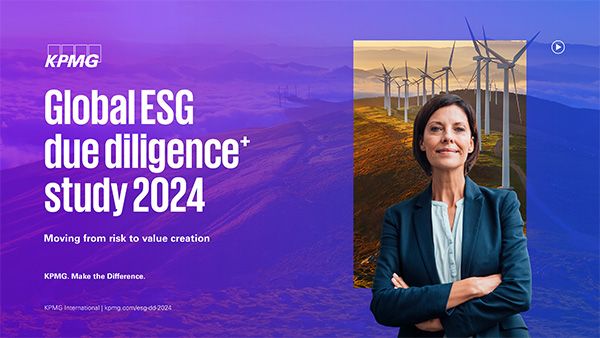
ESG due diligence rising in priority
ESG due diligence remains a priority for dealmakers. In fact, respondents to the latest Global KPMG due diligence study report a rise in ESG priority in transactions over the last 12 to 18 months, despite challenges.
Many global M&A markets have decelerated in the face of higher interest rates. Geopolitical and economic uncertainty has taken its toll, shifting priorities for many businesses. And, in some countries, there is lively public debate about the merits and justifications to include ESG factors in investment decisions.
Despite these headwinds, the findings from our latest survey of more than 600 active dealmakers from 35 geographies confirms the results of the first-ever international study on ESG due diligence. In 2022, we set out to explore ESG sentiments among dealmakers across the Europe, Middle East and Africa (EMA) region. A follow-up study in the US in 2023 found similar developments, albeit slight less pronounced than in the EMEA region.
Global insights at a glance
ESG due diligence continues to rise in importance, despite headwinds.
Dealmakers report an increased importance of ESG due diligence over the past 12 to 18 months, and expect further increases soon.
This counters initial expectations of a decline in the importance of ESG factors due to softer M&A activity, economic uncertainty and an ESG backlash in some countries.
Leading investors tie ESG to the investment thesis and drive financial value from it.
They do this by combining a deep understanding of the commercial, operational, and financial risks and opportunities triggered by evolving ESG regulations and stakeholder expectations with a disciplined focus on financial returns during the holding period. They use tools like comprehensive baselining, integrated 100- day action plans, and a systemic scan for sources of financing to improve their investee’s performance. Such performance improvements can materialize in the form of increasing revenues, decreasing costs, or de-risking of an investment, across various environmental and social and governance areas — at this moment, typically in connection with themes such as decarbonization, recycling and circularity and supply chain management.
Challenges in conducting ESG due diligence persist, but solutions are emerging.
Investors struggle with selecting a meaningful, yet actionable scope with receiving quality data from target companies, and with quantifying potential findings. However, for each of these challenges, there are emerging solutions. On scoping, it is becoming increasingly clear which topics should indeed be part of an ESG due diligence workstream, with the focus moving from values to value. On data quality, we see a great opportunity for sellers and sell-side advisors to drive value from divestments by commissioning higher-quality ESG vendor documentation. And on quantification, the synergies between ESG due diligence teams and commercial and operational due diligence teams are becoming clearer.
Key findings

1. The monetary value of identifying ESG risks and opportunities early (58% of respondents agree)
2. The ability to better respond to regulatory requirements (44% of respondents agree)



Interactive dashboard
Discover the data that drives the world of ESG due diligence with our interactive dashboard. Designed to offer a more personalized view of the data points detailed in our report, this tool allows you to delve deeper into the survey results. With the ability to filter data by region, company type, and sectors, you can gain additional perspectives and insights that go beyond the report.
This dashboard is a companion to the Global ESG due diligence study and when used together, they provide a comprehensive understanding of the findings. Download the report and explore the dashboard today. Unlock the power of data to drive your ESG due diligence decision-making process.
Review our latest insights
Contact our experts
Gabriel Gage
Senior Manager, Sustainability Advisory
KPMG in the Netherlands
gage.gabriel@kpmg.nl
+312 06562478
KPMG firms’ global ESG due diligence methodology
Since the launch of the landmark KPMG ESG due diligence study in the EMEA region in 2022, the state of adoption and prevailing challenges faced by investors have been clear. In response, KPMG ESG due diligence solution leaders worldwide have developed a market-leading, client-informed ESG due diligence methodology that quantifies ESG risks and value creation opportunities, calibrating them against investment materiality. It combines the experiences of the leading practitioners across the global KPMG organization, making them accessible and consistent to our teams globally. The KPMG methodology leverages internationally recognized ESG standards and frameworks, as well as industry specific regulations. It is scalable, enabling tailored scoping for respective targets and sectors, and covers a wide array of ESG topics with input from various subject matter specialists across the global KPMG organization. The methodology is also tech-enabled, drawing on vast public and proprietary ESG benchmarks and data sources globally. Importantly, ESG due diligence findings are calibrated with financial materiality and value drivers, articulated in terms of their strategic business and deal implications.








